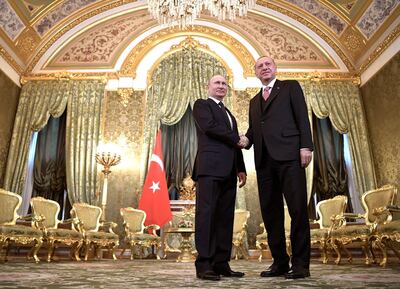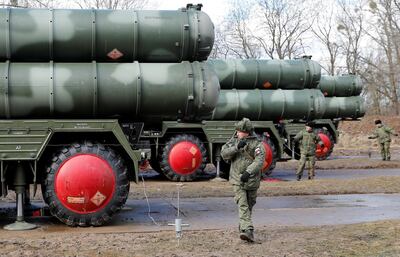From all appearances, Turkish President Recep Tayyip Erdogan and his US counterpart Donald Trump seemed to be getting along swimmingly at their summit last Wednesday. Mr Trump declared he was a "big fan" of Mr Erdogan and claimed the two had been "very good friends" from "day one". But below the surface, it was clear Mr Erdogan was witnessing the limits of his relationship with Mr Trump. Congress's anger over Turkey's recent offensive in Syria has not been defused and the pressure remains for sanctions after Mr Erdogan refused to scrap his deal with Russia to buy its S-400 defence system. Indeed, 17 congressional lawmakers tried to block the visit to the White House in advance and put their names to a letter urging the US president to consider rescinding the invitation.
The two Nato allies face more problems in the coming months as Turkey charts an independent strategic course and the US attempts to pull it back into the fold with western powers. But the more the US imposes penalties on Turkey, the more Ankara will diversify its relationships – in some cases, by looking to America’s rivals in Russia and China.
Mr Erdogan's visit was designed to smooth over tensions caused by Turkey's purchase of the Russian S-400 missile system and its invasion of northeastern Syria on October 9. Mr Trump has fought hard in public to maintain Turkey's image as a reputable and reliable ally. He has trumpeted a ceasefire that US Vice President Mike Pence managed to broker in Syria's northeast between Turkey and the Syrian-based and US-backed YPG, even though the fighting did not completely cease. He has attempted to portray the fighting between Turkey and the Kurds as a schoolyard squabble rather than a decades-long, violent conflict between irreconcilable factions. In so doing, Mr Trump has hoped to minimise the turmoil of the US pullout from Syria and to fend off critics of his foreign policy.
It has not worked. America’s Congress, in rare bipartisan fashion, has been keeping both the S-400 and the Turkish invasion of Syria alive. An Oval Office meeting between top GOP senators, including Lindsey Graham, a strong Trump ally, and Mr Erdogan quickly devolved into accusations and counter-accusations over Turkey’s Kurdish policies. Whatever hopes Mr Trump might have had of smoothing over relations between Mr Erdogan and Congress quickly evaporated.
At its core, this tension is being driven by changing regional geopolitics. Nato is no longer a bulwark against an expansionist Russia; it is an alliance often in search of a mission. Turkey is not on the border of the dismembered Soviet Union, fending off Russian influence; it is a major regional state bordering an unstable Syria and Iraq and managing an occasionally tense relationship with Iran. The US is involved in each of these countries too but its interests are quite different from Turkey’s. Ankara is, therefore, charting an independent course designed to address strategic issues such as the war in Syria and gain access to cutting-edge military technology that the US will not provide. But as it does so, it is building connections to American rivals and clashing with US interests.
This is fuelling the US response. The US wants Turkey to remain firmly in the western sphere of influence while at the same time valuing American allies and interests, as it often did during the Cold War. It is worried about global Russian and Chinese influence as well. As Turkey diversifies its arms and economic relationships, especially with Russia, it is butting up against deeply entrenched American interests.

These interests remain mostly strongly entrenched in both the Pentagon and Congress. The Pentagon is lobbying the rest of the administration to do what it can to both minimise risks to the American military as Turkey diversifies and to keep America's commitments to its YPG allies at least partially alive. The US military sees Russian arms purchases as a potential threat to its own assets; the S-400, for example, could learn to track and target high-tech Nato aircraft. That information could then be leaked to the Russians, undercutting Nato's technological superiority. The more Russian arms Turkey purchases, the greater the risk of this situation becoming a reality. The Pentagon also wants to preserve some of its influence with the YPG, in part out of loyalty for its service in the battle against ISIS and in part because of its ongoing value to America's Syrian strategy.
That Pentagon influence reaches Congress, which adds another layer based on human rights concerns. Congress is worried not only about the strategic dimensions of this Turkish drift towards independence but also how Turkey, especially under Mr Erdogan, has not always taken careful steps to preserve human rights. Congress fears for the treatment of Syrian civilians at the hands of Turkish forces and its associated proxies – worries reinforced by reports from US intelligence of potential violations already being committed. Combined, this is a potent pressure able to override Mr Trump’s preference for closer relations with Turkey.
Ankara cannot wholly abandon this diversification strategy. Not only would that be political suicide for Mr Erdogan to cave in to American demands at home but relying on the US has not completely addressed Turkey’s strategic needs. Instead, Turkey must absorb whatever US reaction there is, from sanctions to disrupted diplomatic relations, because the costs of hewing close to the US are much greater than whatever punishment the Americans will mete out.
This means sanctions on Turkey will be imposed in some form or another, but it will not persuade Ankara to change its overall strategy in response. If anything, Turkey will risk even more disruption with the US in the future. A looming issue is the US-led F-35 fighter jet development programme, which the Americans unceremoniously ejected Turkey from in July. Ankara will be looking for a replacement and Russia has made it clear its Su-57 stealth fighter might be available to Turkey, should it so desire. That would again draw the ire of the US, with accompanying consequences – and Mr Erdogan would again brush off those consequences if it saw the Su-57 as a vital piece of equipment for his own regional strategies.
Such tensions don’t herald the end of the Nato relationship. But they are becoming a feature of it – leaving Turkey and the US in a turbulent alliance, strained by irreconcilable goals and undercutting future co-operation in the Middle East.
Ryan Bohl is a Middle East and North Africa analyst at geopolitical risk consultancy Stratfor, focused on regional strategy, security, politics and social contracts


